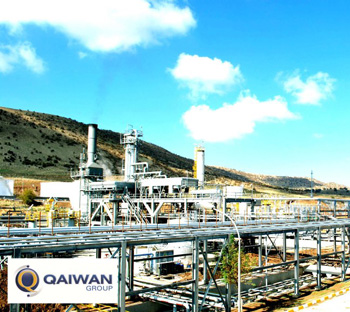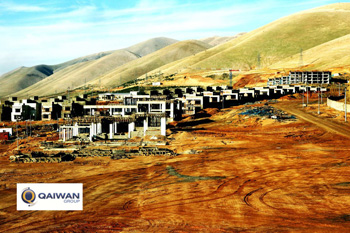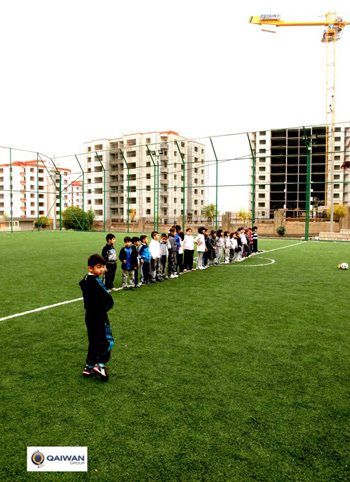Qaiwan Group: Growth of Oil and Gas Sector in Kurdistan to Overpass the Predictions
Saad Hassan claims any estimates for the growth of oil and gas sector in Kurdistan are going to be surpassed; the growth will be immense. Qaiwan Group is a regional company present in different countries, employing more than 2,000 people. Mr. Hassan’s dream for the company is to get it listed among at least the 100 largest companies in the world in ten years’ time.

What is your outlook for the oil and gas sector for 2013 and onwards? There have been huge discoveries of oil and gas reserves in the Kurdistan region that no one ever believed existed under Kurdistan. What are the prospects?
We are not yet involved in the upstream sector, but as you may well have heard the country is built on oil. We are talking about 100-200 trillion cubic feet of natural gas and 45 billion barrels of oil, with possibly another 25 billion potential barrels in unproven reserve. Of course a lot of discoveries are happening and there have been a great number of contracts that have already been signed. Now the major companies are coming here, some already are here. It is on-going; discoveries are increasing day by day. The Ministry of Natural Resources has said that by 2015 we will be producing one million barrels of oil a day.
You are involved in midstream and downstream with your refinery. We spoke to the Prime Minister and he has said that self-sufficiency is the main priority for the government. As a refiner you are helping this initiative. The Kurdistan region needs a lot more refined products. The government is trading diesel cars etc. How do you see the refining capacity in the Kurdistan region?
We are on the right track; we used to have no barrels of refined products, now we have more than 100,000 barrels of refined products. At the Baziyan Refinery we have increased production from 20,000 barrels to 40,000 barrels. This has been completed with great success. We are building a gasoline block to produce gasoline from the refinery. By the second quarter of 2013 we will produce gasoline. Currently we are producing kerosene and diesel. We do not yet produce gasoline because the block is yet to be completed and the process requires more complex technology.  This is why we couldn’t complete the processing of 35,000 barrels per day of refined crude oil, but in a couple of months we should be producing our own gasoline. There are projects similar to those we have in Erbil, which have been producing gasoline since the beginning of 2011. This means that right now we have Kurdish gasoline. The second project for Kurdish gasoline production will be undertaken by Bazilyan Refinery by the second quarter of 2013. Therefore in a couple of months we will be self-sufficient. We will no longer need to import gasoline into the Kurdistan region.
This is why we couldn’t complete the processing of 35,000 barrels per day of refined crude oil, but in a couple of months we should be producing our own gasoline. There are projects similar to those we have in Erbil, which have been producing gasoline since the beginning of 2011. This means that right now we have Kurdish gasoline. The second project for Kurdish gasoline production will be undertaken by Bazilyan Refinery by the second quarter of 2013. Therefore in a couple of months we will be self-sufficient. We will no longer need to import gasoline into the Kurdistan region.
We also spoke to the KAR Group who runs the Kalak Refinery. As all this capacity becomes available the Kurdistan region will be able to export. Does this mean that there is tension now with Kalak? Is there competition between you two?
Not really, I would say we do not compete against each other but we complete each other. We have a very good relationship with the owners of KAR Group. We are both working in the same line and for the future of self- sufficiency for our region. We both have new expansion plans that have been approved by the Ministry of Natural Resources to be able to increase our production, which includes the gasoline block to produce high quality and unleaded gasoline. We hope to be able to increase our production enough so that we will be able to export as we all know the world needs energy!
Now let’s talk about Qaiwan Group, you are present in real estate, electronics, trading, downstream distribution of oil and you have the refinery. It is a diverse group so how do you manage this complexity?
I think that in the oil sector over the next few years the growth will be immense as there will be much more activity, infrastructure and exploration here in this sector. We are just beginning to develop… I think any predictions of growth in the oil sector are sure to be surpassed.
The Qaiwan Group is a diversified group of companies working in different sectors such as the downstream oil sector, construction and distribution of both oil products as well as electronics.
Starting with oil and refineries; we own the biggest refinery in Sulaymaniyah, which is called the Bazilyan Refinery. The first phase of this refinery was 20,000 barrels of crude distillation. We upgraded the refinery and expanded to then reach a capacity of 40,000 barrels of crude oil. This expansion has been completed and we are running at this capacity. We also have a gasoline block. The construction is completed, we are in the pre-commission stages at the moment and by April we shall be producing gasoline. The total budget of the plant was US $280 million. We completed the project within the budget. We have a second expansion project which is cutting edge in terms of refineries. The initial cap of exports will be US $700 million. The upgrade will be over a period of four years.
In terms of oil trading; we have always been at the forefront of oil trading in this region. We are the biggest Kurdish oil trader to exist in Kurdistan. As Kurdistan has no coastline, we need a logistical network of tanker trucks to be able to get to the sea and ship our oil to the international market. We are the first and only Kurdish company who owns three vessels. As I say we have a very strong logistical network with all the required facilities for oil trading. We also have gas stations which are currently in the early stages. Our plan is to have a distribution of oil products as well as gas stations for the whole of the Kurdistan region and eventually for the whole of Iraq.
In terms of construction; we are a developer and not a contractor. We develop projects. We have executed various projects, such as Qaiwan City phase 1 and 2. Phase 1 was completed with 360 units of high quality apartments and houses.  The 2nd phase has around 1,000 villas and apartments and is 80% complete, there are people who have already moved in so we are well on the way to completion. The 3rd project under construction is Qaiwan Twin Towers which is in downtown Sulaymaniyah. It will be two towers with a shopping mall in the centre. One tower will be for commercial offices and the other will be for the Rotana Hotel. This project is under construction and the first tower will hopefully be opened by the second half of 2013. The hotel will be opened later. Another project we have is Sulaymaniyah Heights, with an initial budget of US $500 million. It will consist of 3,000 units of houses and apartments, it is considered to be the most advanced project in Sulaymaniyah. We also have various smaller projects that I won’t go into now.
The 2nd phase has around 1,000 villas and apartments and is 80% complete, there are people who have already moved in so we are well on the way to completion. The 3rd project under construction is Qaiwan Twin Towers which is in downtown Sulaymaniyah. It will be two towers with a shopping mall in the centre. One tower will be for commercial offices and the other will be for the Rotana Hotel. This project is under construction and the first tower will hopefully be opened by the second half of 2013. The hotel will be opened later. Another project we have is Sulaymaniyah Heights, with an initial budget of US $500 million. It will consist of 3,000 units of houses and apartments, it is considered to be the most advanced project in Sulaymaniyah. We also have various smaller projects that I won’t go into now.
In terms of electronics; since 2004 we have been the sole distributor of the Hitachi Japan brand. We are the only agent in the whole of Iraq distributing Hitachi products.
This diversity of working in different projects has advantages and disadvantages. Of course it means you have to put in more time and effort to be able to keep track of all the diverse projects to make sure everything runs smoothly. It also means that if you have one project that isn’t doing so well, you are sure to have another that is doing very well!
The overall turnover for the Qaiwan Group for 2012 was US $3 billion. The Qaiwan group’s growth for 2012 was quite high, so we are expecting similar growth for 2013. Since we are in a developing country the company’s growth for 2012 was 100% or above. We are doing well and are very happy and proud of our performance and reputation. We are not only doing business for our company’s benefit but we also look after our social responsibilities. We help schools, universities and hospitals. We dedicate 2.5% of our assets every year to help public sector projects and infrastructure.
In your opinion how fast are the real estate construction sector and the oil and gas sector growing? What do you think about some critics’ views about the real estate bubble? Has it been over-rated?
I don’t think so. My colleagues are always telling me that I am an optimistic guy. I think you have to be optimistic about this country. This country has great potential; we are building over 12 trillion oil reserves. We are not over populated; but we are in a very fast growing country. Our government is doing very well in terms of public services and building infrastructure. There is great potential here. The climate of Kurdistan is quite different to the rest of Iraq and the rest of the Gulf. Therefore I see great potential for the real estate sector and do not think that it is a bubble. There is still space for values to increase. If you compare the real estate values today to those from 5 years ago you see a huge difference but I still believe there is potential to grow even more. People are talking about the oil and energy sector but there is a buzz about the real estate sector also.
What is your prediction for growth in the real estate sector and the oil and gas sector over the next few years?
I think that in the oil sector over the next few years the growth will be immense as there will be much more activity, infrastructure and exploration here in this sector. We are just beginning to develop this sector. I think any predictions of growth in the oil sector are sure to be surpassed.
In terms of real estate we know that we have had good growth in this sector and I believe there is much more to come.
When we asked somebody in a previous interview ‘what does Kurdistan need?’ they replied the last thing Kurdistan needs is money, however it does need ‘smart’ money, investments in the long term and sustainability for the future. What do you think Kurdistan needs?
I agree with this statement. I think the smart use of money is really important. I do think that wherever you decide to invest money you will see added value in the next few years to come.
Now to look at some statistics for growth and also the number of employees in the Group…
The growth we were talking about was over 2012 and we are expecting the same level for 2013. There are over 2,000 employees working for the Qaiwan Group. We are not just a local company. We are an international company with offices in other countries, such as Syria, Azerbaijan, Turkey, Europe, the Gulf and Dubai mainly. We have quite a lot of good contacts and relationships with the major oil companies and traders; for instance we are working with BP, Vitol and Glencore along with a few others.
Everything looks good, what are the major challenges you face?
As a businessman in the Kurdistan region the only challenge I see would be the political issue and tension. However so far we are doing really well; our government tries to avoid instability and tensions in the region. The only problem you could have is political instability in the region as we are surrounded by several problem areas.
When you travel abroad do you still find that people are unwilling to do business with Kurdistan or Iraq, or has the perception changed?
We have experienced many difficulties as when we talk about Kurdistan we have to mention Iraq and north Iraq. People now know where Kurdistan is and what makes it different from the rest of Iraq. Sometimes you still have to explain but once they have researched the country they find that it is a very different area in terms of stability, investment, economic growth, utility services, government services etc. to the rest of Iraq. Therefore we don’t have as much difficulty as before in terms of being part of Iraq.
You have mentioned several huge projects worth millions of US dollars. How do you finance all of these projects given the current banking structure and credit situation when it is hard to get credit or there are very high interest rates?
This is one of the greatest challenges in Kurdistan; we don’t have a proper banking system here yet. We are starting and several banks finance projects but they have limited capability and the interest rates are not comparable to other countries on the international market. This is one of the sectors that both the private sector and the government should work on; to create a proper banking system. We need to encourage the first class banks to open branches in Kurdistan and to help investors. It would be a big opportunity for them to come to Kurdistan and invest in projects here. In real estate projects you can see the potential in the margins and there is a very low income risk for them. If you ask anyone from Europe or anywhere else in the world to finance in a project they don’t accept but if they saw large financial institutions here their point of view would change and they would help finance projects that would really benefit both the institutions and the investors.
There is a good example of this whereby the Czech Export Bank is offering US $1 billion for KAR Group, it is a sign of people waking up to the Kurdistan call. Do you intend on some sort of similar financial agreement with another bank, or are you considering an IPO?
In terms of IPO, this is still not culturally known to the people here; the institutions are not set up for it. Our projects are currently self-financed, we are able to get credit but so far we have not needed to and it only adds another cost to your business. As long as you can sell or finance your projects you don’t have to look for finance, but obviously in the future everyone will use the banking credit lines.
What is your long term vision, what would you like to see happen?
I would like to see our organisation listed among the 50 or at least the 100 largest companies in the world in ten years’ time.
That could be possible with the growth that we are seeing here. How do you approach the processes of management? Do you look abroad using expats and foreign knowledge?
Yes of course, we are using Microsoft’s advanced software to manage our business. We also have many different experts working in our group to help the business.
Are there any differences in doing business in Erbil to doing business in Sulaymaniyah?
Not really, we have one government so the policies are the same.
Is there anything that you would like to add to this interview?
I would say that Kurdistan is a niche market and region. There are huge opportunities here for investors in any sector; there are great opportunities to do business in Kurdistan.